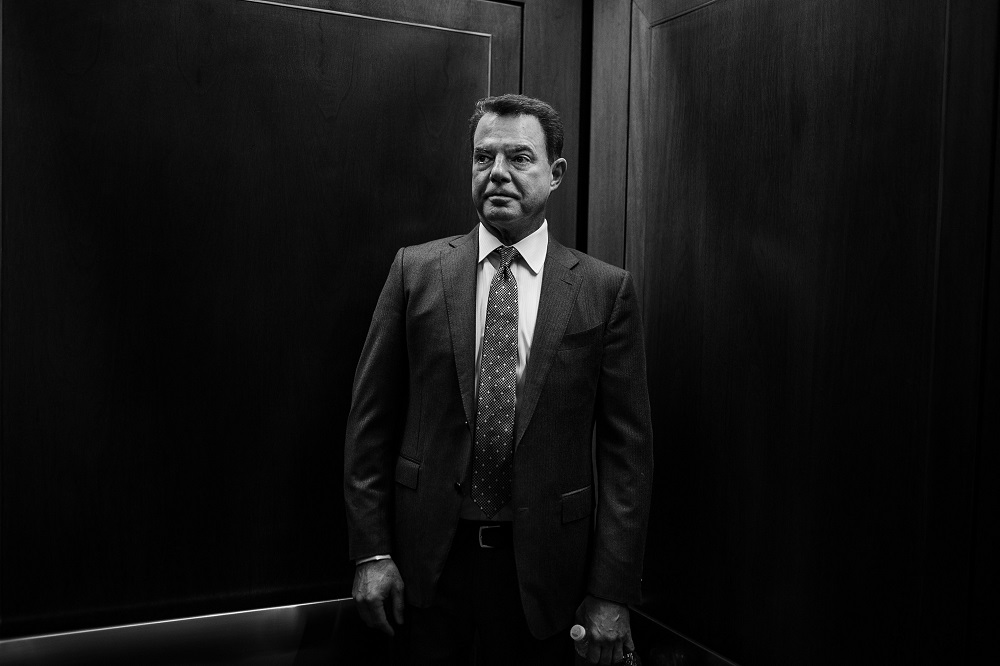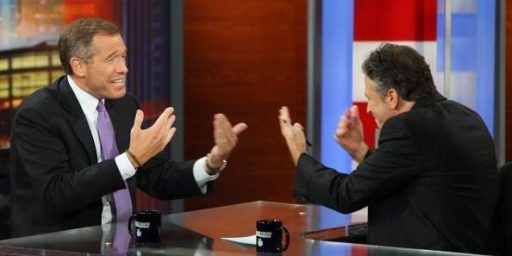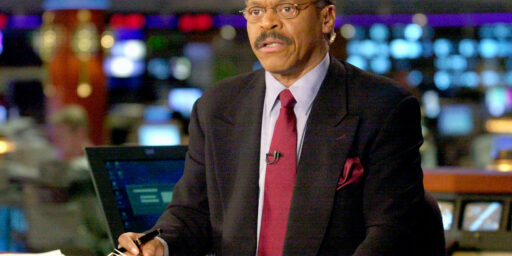The Strange World of Shepard Smith
Having journalistic integrity at the Fair and Balanced network has never been more challenging.

Shepards Smith at Fox News building during a day of work at his TV program Shepards Smith Reporting in New York, Thursday, March 1, 2018. (Photo: Andres Kudacki)
TIME (“Shep Smith Has the Hardest Job on Fox News“):
When the countdown to Smith’s hour of airtime arrives at 2:59, it’s just a number. Smith silently sits at his anchor chair, watching White House Press Secretary Sarah Huckabee Sanders field questions from reporters in what’s become a near-daily occurrence: his show is getting pre-empted by the most popular political drama in America. He scrolls through his phone, then leans forward on his elbows ready for Sanders to wrap. When she does, he kicks off his show a few minutes late with discussion of the “brand-new timeline” Sanders offered for the scandal of the day. Much of his script now useless, Smith does the work of writing and editing as he speaks.
The president has scrambled the day-to-day lives of everyone in the news business, not least of which those at the network with which Donald Trump begins every morning. As Fox has tacked further to the right in its opinion programming, Smith’s role has at times seemed like a challenge. Being the old-fashioned anchorman and reporter at a network known for new-fashioned provocation and opinion may be the hardest job at Fox News, and one Smith mused about walking away from over the course of two interviews this winter. On March 15, the network announced Smith would stay and that he had signed a multiyear contract renewal. Which means Smith is going to have many more chances to tell viewers what they don’t want to hear.
“I can remember a time,” the 54-year-old anchor says after taping has wrapped at 4 p.m., “when we would do a rundown in the morning and, probably, that’s what would happen.” Those around him are feeling the Trump era as well. “I’m tired,” says Kim Rosenberg, the network’s vice-president of news and Smith’s producer and friend. “The news cycle goes through many evolutions during the day. Trump will tweet or they’ll add a news conference or the White House briefing will be pushed back three times, and the news cycle changes.”
Now, his show is often eaten into by the White House’s televised press briefings. “Even now, it still boggles my mind that the next time Sarah Huckabee Sanders is on, over a year into a presidency, that it is something that all three networks will take live,” says Jay Wallace, the network’s president of news since 2017 and Smith’s former executive producer. “That’s unheard-of.” Having hustled in his early career and established his bona fides as an anchor after that, Smith would seem to be at a point where he could enjoy the status, visibility, and routine schedule a marquee anchor enjoys. Instead, Sanders, and her boss, have created a climate of uncertainty that’s forced Smith to improvise.
Smith, a Mississippi native who retains the lilt and the flattened sentence endings of rural hometown Holly Springs, began his career as a local news-affiliate reporter in Florida. He joined Fox News at its founding in 1996 and eventually came to have both daytime and evening broadcasts. In 1999, he launched The Fox Report, the network’s flagship newscast and its version of what the broadcast networks do at 6:30 p.m. Smith became Fox’s closest analogue to the classic voice-of-God newsman. In 2013, the evening show was cancelled. “There used to be a thought that, hey, we need a nightly newscast later in the day,” says Wallace. “Those patterns have changed, just with the way we consume media.” Now Fox’s night-time slate is dominated by opinion—the fire-breathing sort practiced by Tucker Carlson at eight, Sean Hannity at nine, and Laura Ingraham at ten.
Their coexistence with Smith is increasingly uneasy. In November 2017, Smith briskly and effectively debunked the “Uranium One” conspiracy theory, a particular bugbear of Hannity’s. Reporting live on the air in the hours after the February school shooting in Parkland, Fla., Smith read a list of schools that had endured fatal gun violence since Columbine. And this month, Smith said on-air that the president, who’d called for raising the age limit for buying firearms, had caved under political pressure: “The president told the kids at Parkland, ‘I’ll go strong on this, I’ll work on this age thing,'” Smith said. “And then he met with the NRA.” Smith’s treatment of these stories—and how that treatment differs from his opinion-host colleagues’—hasn’t gone unnoticed. Hannity, who wove the Uranium One scandal into his ongoing saga of Hillary Clinton’s mendacity, has called Smith “so anti-Trump.”
Smith says he’s unbothered by the divergence between his reporting and Fox’s opinion slate. “We serve different masters. We work for different reporting chains, we have different rules. They don’t really have rules on the opinion side. They can say whatever they want. If it’s their opinion. I don’t really watch a lot of opinion programming. I’m busy.” He laughs, enigmatic punctuation that may indicate he’d been trying for a bon mot, or might just be a Mississippi-nice way of indicating he’s said what he’s going to say, bless my heart.
But Smith isn’t kidding when he says he’s busy. He has his hour and leads the unit of 17 staffers that breaks into coverage when major news occurs. He’s the person Fox News viewers see during a hurricane, or a school shooting. “I’ve been telling people about what’s happening for a long, long, long time,” Smith says. He takes a long and considered pause. “I know that when something big happens, people turn to us. I think people always will. People who maybe aren’t with us all the time who aren’t regular watchers, maybe there is some sort of confusion about what’s opinion and what’s news, but I think our audience understands the difference and comes to us when they need us.”
Unlike some portion of the audience that reflexively switches on Fox News, Smith is disengaged by politics. “I get it,” he says, “that some of our opinion programming is there strictly to be entertaining. I get that. I don’t work there. I wouldn’t work there. I don’t want to sit around and yell at each other and talk about your philosophy and my philosophy. That sounds horrible to me.” He cites his values growing up: “You don’t talk about your money, you don’t talk about your politics, and you don’t talk about your sex. Right now, everyone wants to talk about those things, and I’m not one of them. Not going to do it.”
This becomes clear in our first meeting when I broach his personal life; Smith, who’d been dogged by rumors for much of his career, publicly acknowledged he is gay in 2017. “I think that’s the part you like,” he shoots back when I ask if his boyfriend of six years works in the news business. Some of the honey drips away from his drawl. “I don’t mind talking about it. It’s just, you know, that’s just my personal life. And I’m not hiding anything. I have a longtime boyfriend and we’re as happy as we can be and we live a very normal life and go to dinner and go to games and see his family and see my family. It’s great for us. But I can’t imagine anyone else finding it interesting.”
There’s a lot more to the feature and I commend it to you.
My view of Fox News has evolved over the last 20-odd years. I watched it almost from its 1996 beginning and was a big fan of Brit Hume and his nightly Special Report newscast. I wasn’t so fond of Smith in those days because his delivery seemed comparatively sensationalistic. And, even though I was much more in tune with their political philosophy, I never cared for Sean Hannity, who struck me as a dope, and Bill O’Reilly, who was a blowhard.
I haven’t really watched much television news since starting OTB in January 2003. Almost immediately, I started shifting away from broadcast and even print sources because they were simply less blogable. I stayed with the Sunday talking heads shows the longest but tired even of those before long. Now, aside from the occasional breaking news story and televised address, I get no political news from television.
My knowledge of Smith these days, then, comes second- and third-hand, from various clips on the comedy shows and various reports on the web. Either he’s toned down his bombast or he just seems comparatively muted in a more raucous media environment. At this point, though, he seems like a veritable Brian Lamb.
Like Hume before him, he’s the face of the news division of an increasingly clownish infotainment network. Even in the old days, Special Report w/ Brit Hume, the relatively straight newscast, had a roundtable at the end where pundits opined on the news. And, even then, it was difficult to persuade people that the news side of the house, while plainly shaded to a conservative point of view compared to the other networks, indeed had journalistic integrity and was a separate entity from the talking heads who dominated prime time. Smith has no chance of convincing people of that now.
Beyond the Fox angle, though, the excerpt above gives some interesting insights into how frustrating it must be to attempt to cover the news nowadays. On an “emergency” episode of his Deep State Radio podcast, David Rothkopf told us that he went from Washington to Boston to appear on a news network to talk about the Rex Tillerson firing. By the time he got there—mere hours after the fact—that story had already become stale and the news cycle had moved on. In that particular case, it was to the Pennsylvania special election—a known event. But there’s so much drama coming out of this White House that nightly newscasts are virtually an improv act at this point.




![Shepard Smith Out at Fox [UPDATED]](https://otb.cachefly.net/wp-content/uploads/2019/10/shepard_smith_fox_news-512x256.jpg)

Disagree. I’ve been following Shep for a few years now (like you, 2nd and 3rd hand) and he has always impressed me with his straightforward delivery of the news and his intolerance for the stupid, most recently demonstrated by his utter and complete demolition of the Uranium One BS.
The fact that he has been at FOX for over 20 years and in fact just got a new contract is rather convincing evidence that yes, the news room does have a set of rules, where facts do in fact matter, where as SH, TC, and LI can just say or do whatever the f they want, facts be damned.
@OzarkHillbilly: Yes, I think he’s been extraordinary. Better as a counterweight than even Brit Hume was—although there’s more contrast now. I’m just saying that the Fox brand is so much tied to Trump now that few people are going to believe that the news side isn’t part and parcel of that machine.
@James Joyner: Maybe, but he convinced me early in Obama’s presidency. Of course, considering how unhinged the FOX talking heads were at the time and memory being as fallible as ever, maybe that was a pretty low bar. Listening to some back and forth between him and Wallace has even gotten me to soften my opinion of Wallace.
@OzarkHillbilly: I think Wallace suffers in comparison with his father, who’s a legend in the business. He was never particularly charismatic but I always found him competent and fair.
@James Joyner: Following in Daddy’s footsteps is always problematic for those who want to stand out on their own.
I did not give him enough credit.
It would’ve been nice if Fox clearly separated their News and Opinion shows. There’s enough g-damn TV channels to have one for each.
And Hume now, in his semi-retirement, has clearly moved into the opinion/commentary business.
@Franklin: I’m pretty sure that the news side loses money. which is not unusual for network news. Spinning it off would just be sending a message that they were going to kill it entirely. I’m not sure why they don’t. It adds no value and Fox News watchers are not really there to be informed. Remember – more than one study has shown that people who list Fox News as their main source of news are actually less informed about the real world than people that don’t consume any news media at all. That’s quite an accomplishment.
@MarkedMan: That is quite possibly true (that’s it is losing money), and I should have guessed. Although it’s cliche, I lament that classic journalism can no longer seem to support itself.
Did it ever?
@Franklin:
FTFY, even while agreeing.